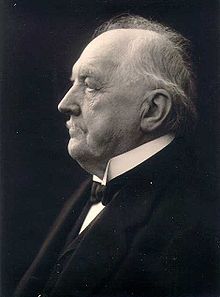Martin Wilhelm Kutta
Contenu soumis à la licence CC-BY-SA. Source : Article Martin Wilhelm Kutta de Wikipédia en français (auteurs)
Regardez d'autres dictionnaires:
Martin Wilhelm Kutta — (1867 1944) Born November 3, 1867 … Wikipedia
Martin Wilhelm Kutta — Martin W. Kutta Martin Wilhelm Kutta Nacimiento 3 de noviembre de 1867 Pitschen, Alta Silesia … Wikipedia Español
Martin Wilhelm Kutta — ca.1925 Martin Wilhelm Kutta (* 3. November 1867 in Pitschen, Oberschlesien; † 25. Dezember 1944 in Fürstenfeldbruck) war ein deutscher Mathematiker. Von 1885 bis 1890 studierte er an der Universität Breslau, danach bis 1894 … Deutsch Wikipedia
Martin Wilhelm Kutta — (3 de noviembre de 1867 25 de diciembre de 1944) físico y matemático alemán. Kutta nació en Pitschen, Silesia (en la actualidad pertenece a Polonia). Asistió a la Universidad de Breslau de 1885 a 1890. Continúo sus estudios en Munich hasta 1894,… … Enciclopedia Universal
Kutta — Martin Wilhelm Kutta (* 3. November 1867 in Pitschen, Oberschlesien; † 25. Dezember 1944 in Fürstenfeldbruck) war ein deutscher Mathematiker. Von 1885 bis 1890 studierte er an der Universität Breslau, danach bis 1894 an der Universität München.… … Deutsch Wikipedia
Kutta-Joukowski-Transformation — Urbild und Bild einer Kutta Schukowski Transformation Die Kutta Schukowski Transformation, oft auch nur Schukowski Transformation oder nach anderer Transkription Joukowski Transformation genannt, ist ein mathematisches Verfahren, das Anwendung in … Deutsch Wikipedia
Kutta condition — The Kutta condition is a principle in steady flow fluid dynamics, especially aerodynamics, that is applicable to solid bodies which have sharp corners such as the trailing edges of airfoils. It is named for German mathematician and aerodynamicist … Wikipedia
Kutta-Jukowski — Théorème de Kutta Jukowski Le théorème de Kutta Jukowski est un théorème fondamental d aérodynamique qui concerne la portance d un profil d aile . C est le fruit de la recherche au début du vingtième siècle de deux aérodynamiciens, Martin Wilhelm … Wikipédia en Français
Kutta-Schukowski-Transformation — Urbild und Bild einer Kutta Schukowski Transformation Die Kutta Schukowski Transformation, oft auch nur Schukowski Transformation oder nach anderer Transkription Joukowski Transformation genannt, ist ein mathematisches Verfahren, das Anwendung in … Deutsch Wikipedia
Kutta–Joukowski theorem — The Kutta–Joukowski theorem is a fundamental theorem of aerodynamics. It is named after the German Martin Wilhelm Kutta and the Russian Nikolai Zhukovsky (or Joukowski) who first developed its key ideas in the early 20th century. The theorem… … Wikipedia

